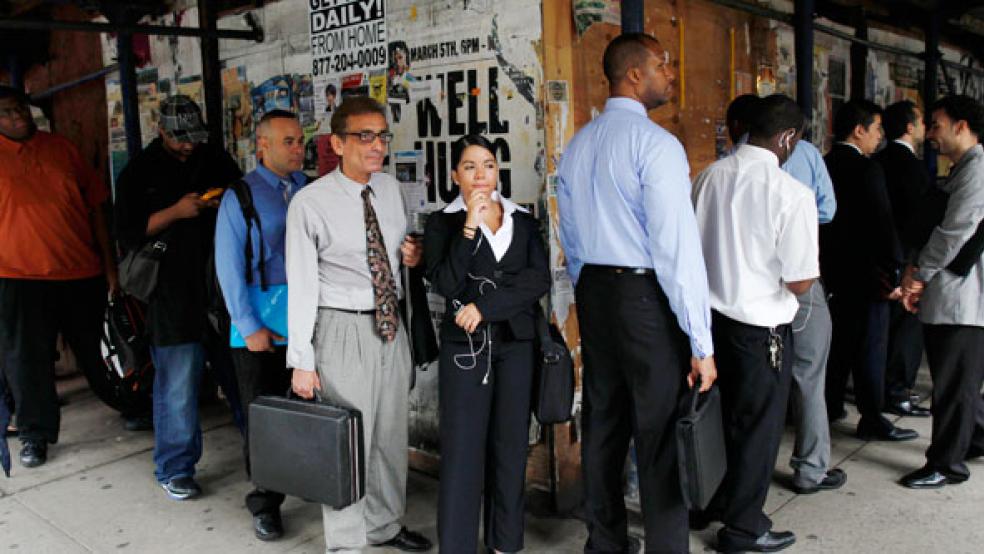The high unemployment rate ought to be a national emergency. There are millions of people in need of jobs. The lost income as a result of the recession totals hundreds of billions of dollars annually, and the longer the problem persists, the more permanent the damage becomes. Why doesn’t the unemployment problem get more attention? Why have other worries such as inflation and debt reduction dominated the conversation instead? As I noted at the end of my last column, the increased concentration of political power at the top of the income distribution provides much of the explanation.
Consider the Federal Reserve. Again and again we hear Federal Reserve officials say that an outbreak of inflation could undermine the Fed’s hard-earned credibility and threaten its independence from Congress. But why is the Fed only worried about inflation? Why aren’t officials at the Fed just as worried about Congress reducing the Fed’s independence because of high and persistent unemployment?
RELATED: White Working Class: Angry, Cynical and Losing Faith
Similar questions can be asked about fiscal policy. Why is most of the discussion in Congress focused on the national debt rather than the unemployed? Is it because the wealthy fear that they will be the ones asked to pay for monetary and fiscal policies that mostly benefit others, and since they have the most political power their interests – keeping inflation low, cutting spending, and lowering tax burdens – dominate policy discussions?
There was, of course, a stimulus program at the beginning of Obama’s presidency, but it was much too small and relied far more on tax cuts than most people realize. The need to shape the package in a way that satisfied the politically powerful, especially the interests that have captured the Republican Party, made it far less effective than it might have been. In the end, it had no chance of fully meeting the challenge posed by such a severe recession, and when it became clear that additional help was needed, those same interests stood in the way of doing more.
Republican policymakers give us all sorts of excuses for blocking further action to help the unemployed. We are told the problem is structural – there is a geographical or talent mismatch between labor availability and labor needs – and nothing can be done to help. But something can be done. We can help workers move to where the jobs are, encourage firms to locate in areas where workers are readily available, and help with job retraining. If mismatches are really the problem, why aren’t Republicans leading the charge on these policies? If they care about the unemployed rather than the tax burden of the wealthy, then why are they allowing community colleges – one of the best ways we have of providing job training for new and displaced workers – to be gutted with budget cuts?
We are also told that the deficit is too large already, but there’s still plenty of room to do more for the unemployed, as long as we have a plan to address the long-run debt problem. But even if the deficit is a problem, why won’t Republicans support one of the many balanced budget approaches to stimulating the economy? Could it be that these policies invariably require higher income households to give something up so that we can help the less fortunate? Tax cuts for the wealthy are always welcome among Republicans no matter how it impacts the debt, but creating job opportunities through, say, investing in infrastructure?
Forget it. Even though the costs of many highly beneficial infrastructure projects are as low as they get, and even though investing in infrastructure now would save us from much larger costs down the road – it’s a budget saver, not a budget buster – Republicans leaders in the House are balking at even modest attempts to provide needed job opportunities for the unemployed.
The imbalance in political power, obstructionism from Republicans designed to improve their election chances, and attempts by Republicans to implement a small government ideology are a large part of the explanation for why the unemployed aren’t getting the help they deserve.
But Democrats aren’t completely off the hook either. Centrist Democrats beholden to big money interests are definitely a problem, and Democrats in general have utterly failed to bring enough attention to the unemployment problem. Would these things happen if workers had more political power?
When we talk about leveling the playing field, it is generally in terms of economic opportunity. However, leveling the political playing field is just as important, and in the past unions provided workers with a powerful voice in the political arena. But unions have largely faded from the scene, leaving workers with very little organized power. Correcting the political imbalance this has created through the renewed political empowerment of the working class must be part of any attempt to improve our response to serious recessions.





